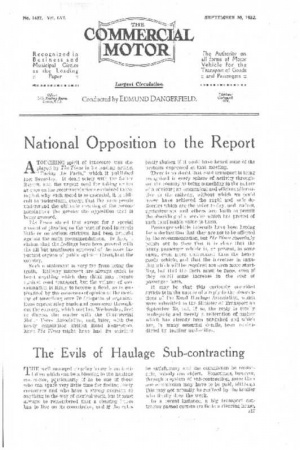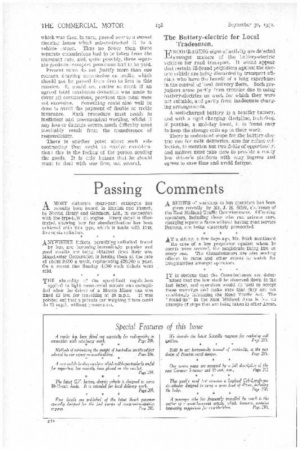The Evils of Haulage Sub-contracting
Page 35

Page 36

If you've noticed an error in this article please click here to report it so we can fix it.
THE well-managed clearing house is an insti tution which can be a blessing to the haulage contractor, partiCularly if he be one of those who can spat very little time for finding likely customers and who have a strong aversion to anything in the way of clerical work, but it must always be remembered that a clearing house has to live on its commission, and if the rates be satisfactory and the commission be reasonable, nobody can object. Sometimes, however, through a system of sub-contracting, more than one commission may have to be paid, although this may not actually be realized by the haulier who finally does the work.
In a recent instance, a big transport contractor passed certain traffic to a clearing house, al? which was then, in turn, passed over to a second clearing house which sub-contracted it to a vehicle owner. Thus no fewer than three separate commissions had to be taken from the transport rate, and, quite possibly, three separate goods-in-transport premiums had to be paid.
Present rates do not justify more than one concern drawing commission on traffic, which should not be passed from firm to firm in this manner. It would not matter so much. if an agreed total maximum deduction was made to cover all commissions, provided this total were not excessive. Something could also well be done to avoid the payment of double or treble insurance. Such procedure must result in inefficient and uneconomical working, whilst if any loss or damage occurs, much difficulty must inevitably result from the transference of responsibility.
There is another point about such subcontracting that ought to receive consideration: this is the feeling of the person sending the goods. It is only human that he should want to deal with one firm, not several,
The Battery-electric for Local Tradesmen.
vNCOURAGING signs of activity are detected 'J amongst makers of the battery-electric vehicles for road transport. It would appear that certain ill-found prejudices against the electric vehicle are being discarded by transport officials who have the benefit of a long experience in the control of local delivery fleets. Such prejuqices arose partly from troubles due to using battery-electrics on work for which they were not suitable, and partly from inadequate charging arrangements.
A ,well-charged battery is a healthy battery, and with a rigid charging discipline, including, if possible, a mid-day boost, it is found easy to keep the storage cells up to their work.
There is undoubted scope for the battery-electric van for milk deliveries, also for refuse collection, to mention but two fields of opportunity, and makers must take care to provide a really low driver's platform with easy ingress and egress to save time and avoid fatigue.






































































































